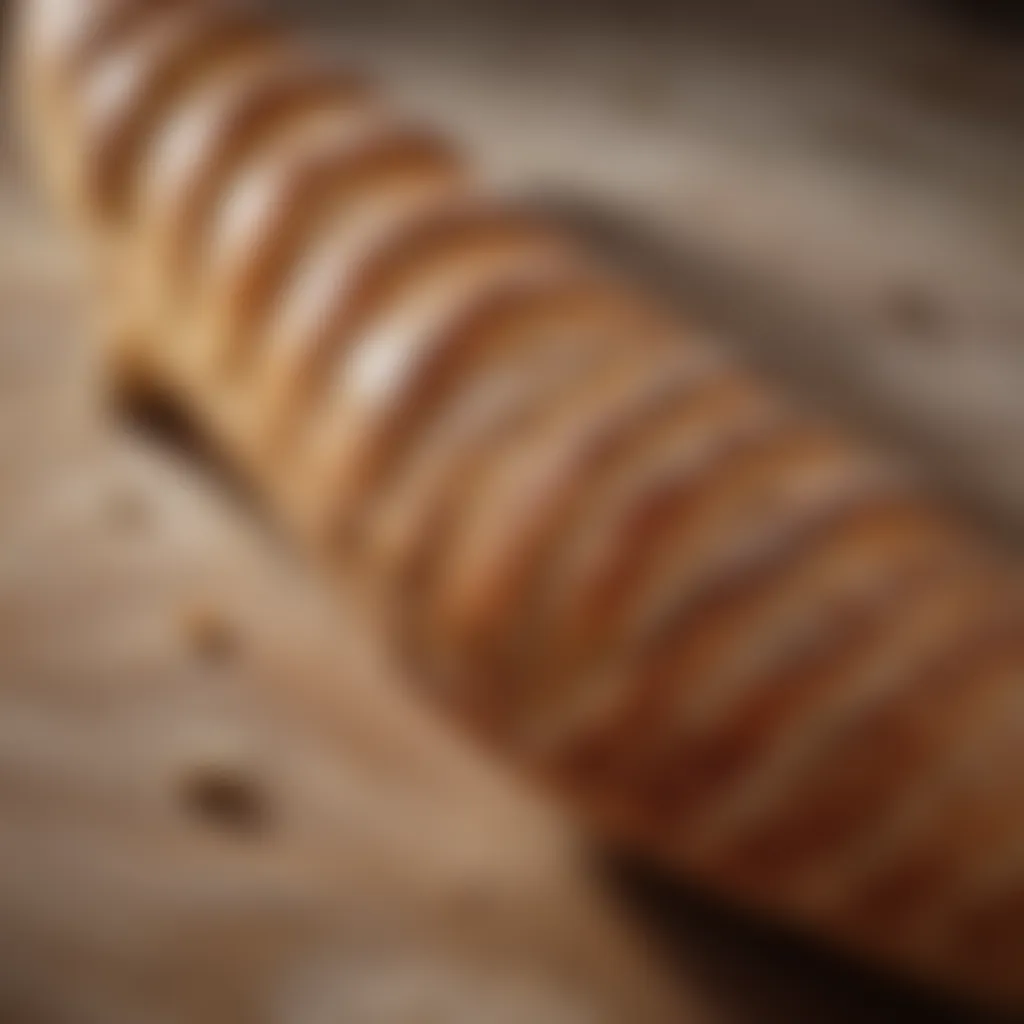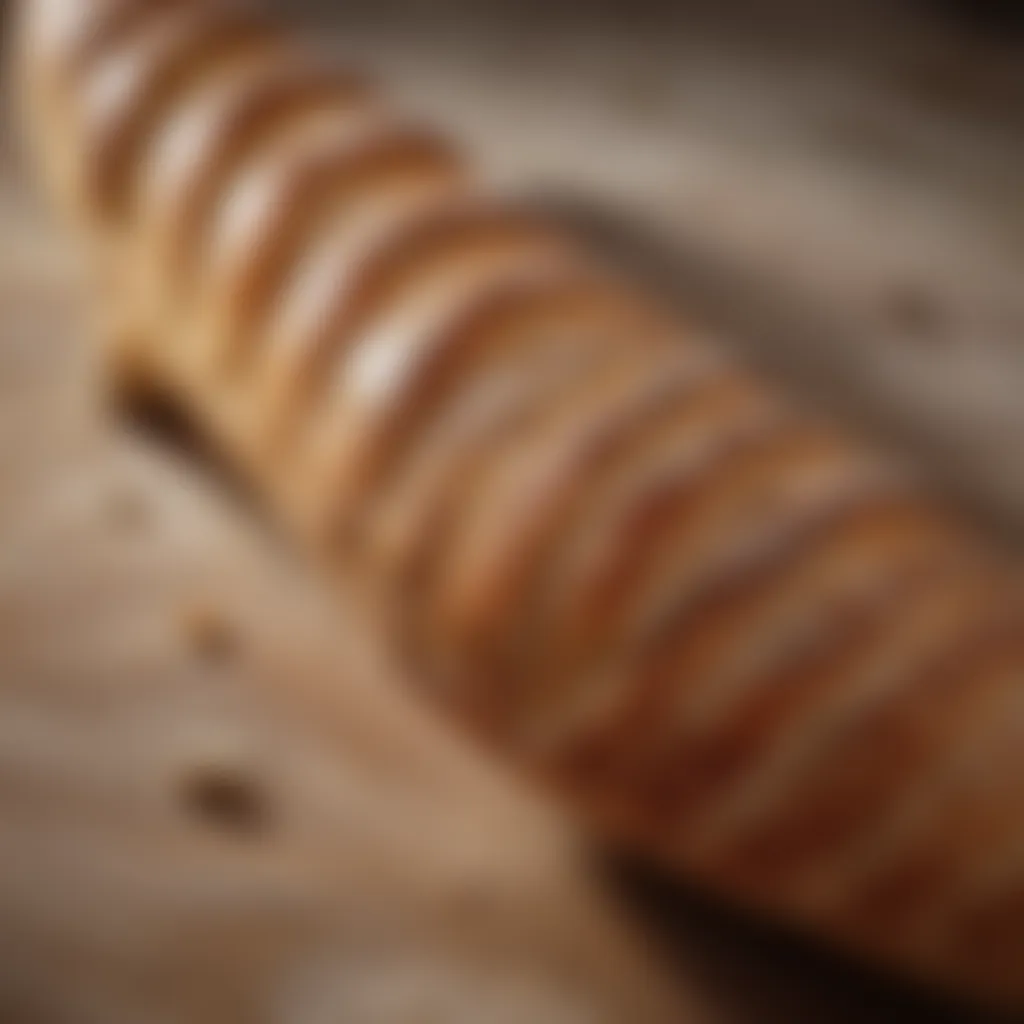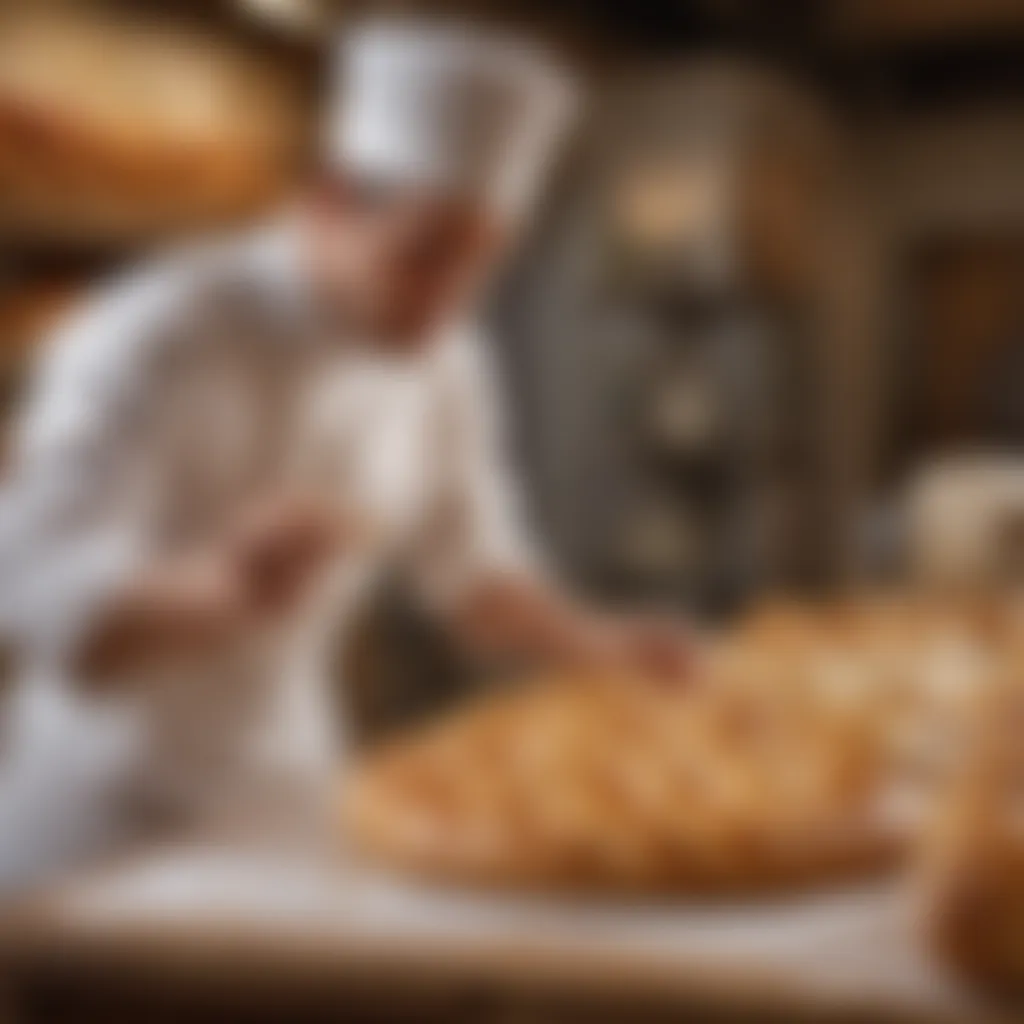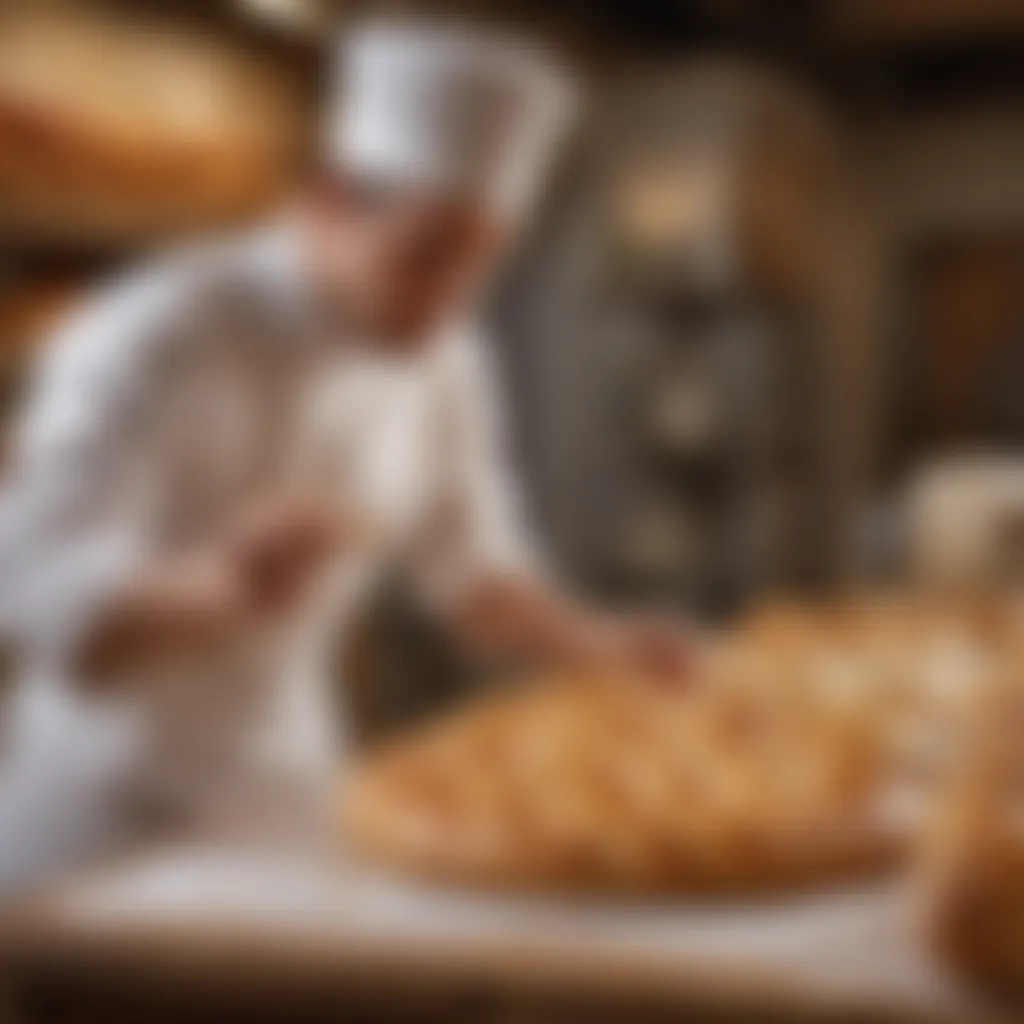Exploring the Role of Bakeries in French Culture


Intro
Bakeries stand as iconic pillars within French culture, notions drifting at the scent of freshly baked baguettes and croissants. These establishments are more than just places to buy bread; they encapsulate historical practices, regional flavors, and a social fabric tied deeply to the nation’s identity. From bustling Parisian streets to sleepy villages in Provence, the bakery's presence signifies much more than sustenance; it represents tradition and a community hub where stories unfold.
The bakery experience in France is likened to a ritual, one where the act of purchasing bread merges with social interaction. With every loaf or pastry sold, there's an exchange of warmth and welcome - a nod to the bakers who, with skill and passion, weave the threads of French culture into the very essence of their baked goods.
However, understanding this phenomenon requires a closer look at the numerous facets that bind bakeries and French society. Therefore, we will break down each aspect—from the ingredients that form the foundation of these culinary delights to the techniques perfected over generations. This exploration encourages a deeper appreciation for the artistry involved in baking and its integral role in shaping cultural identity.
Follow along as we dissect the craft of bakery in France, showcasing both the historical significance and the contemporary evolution that keep it alive and relevant today.
Ingredients:
To embark on our journey, we first must gather our ingredients. Here's a list essential for crafting classic French baguettes, a staple that carries with it a wealth of history:
- Flour – 500 grams (preferably T65)
- Water – 325 ml (room temperature)
- Salt – 10 grams
- Yeast – 5 grams (active dry yeast or fresh yeast)
Gathering the right ingredients is a crucial step in the baking process. The quality and type of flour can significantly impact the texture and rise of your dough.
Detailed Instructions:
Preparation Steps
- Activate the Yeast:
- Mix the Ingredients:
- Kneading:
- First Proof:
- Combine the yeast with 100 ml of warm water (not hot, about 37°C). Let it sit for about 10 minutes until it becomes frothy.
- In a large bowl, mix the flour and salt. Once incorporated, create a well in the center. Pour in the yeast mixture along with the remaining water.
- Mix with a wooden spoon or your hands until it starts to come together. Transfer the dough to a floured surface and knead for about 10 minutes. You’re looking for a smooth, elastic texture.
- Place the dough in a greased bowl, cover it with a damp cloth, and let it rise in a warm place for approximately 1-2 hours or until it doubles in size.
Technical Aspects:
The following settings are standard and important:
- Proofing Temperature: Ideally around 24-26°C.
- Oven Temperature: Preheat to 230°C.
- Baking Time: 20-25 minutes.
Cooking Process
- Shaping the Dough:
- Final Shaping:
- Second Proof:
- Scoring the Baguettes:
- Baking:
- Once the dough has risen, punch it down to release air. Divide it into smaller pieces (about 250 grams each if making standard baguettes). Shape each piece into a cylinder. Allow them to rest for 15 minutes.
- Shape each rested piece further into a longer baguette form. Place on a floured baking sheet or baguette tray, covering them with a cloth.
- Let the shaped dough rise again for about 30-45 minutes. Look for a slight increase in size.
- Using a razor or sharp knife, make diagonal slashes across the top. This allows steam to escape during baking.
- Place your tray in the oven with a tray of water at the bottom to create steam. Bake for 20-25 minutes until golden brown.
Troubleshooting Tips
- If the dough doesn’t rise, check the yeast freshness.
- For overly dense bread, consider adding more water to the dough mixture.
- If your crust is too hard, try reducing baking time or placing the tray of water at a different point in the oven.
Remember, baking is as much an art as a science. Small adjustments based on your specific environment can lead to delightful differences in your final product.
Understanding these steps will not only connect you with the rich culture surrounding French bakeries but also enrich your cooking repertoire, allowing you to create a staple that can be enjoyed fresh at home.
Foreword to French Bakery Culture
The bakery has a profound significance in French culture that goes far beyond the act of baking bread. It serves as a cornerstone of daily life, intertwining history, community, and tradition. French bakeries are not just places to obtain food but hubs where culture thrives, embodying a rich tapestry of French identity.
Understanding the importance of the bakery concept can enlighten one on various facets of French society, from the historical evolution to contemporary practices. The local boulangerie is often the first spot a person familiarizes with when they move to a new area, showcasing its role as a pivotal social gathering point.
This exploration into the realm of bakeries also emphasizes the different types of breads that not only serve as food but as symbols of craftsmanship and heritage. Bread in France is often viewed as a fundamental staple. It is a representation of the land, the labor, and the community. Delving into the practices, traditions, and ties related to these establishments may reveal key insights about the broader cultural landscape.
More than just sustenance, bread forging relationships amongst people. Sharing a loaf or partaking in local customs surrounding bread breaks barriers and fosters social connections. It is not merely about taste; it is about experience and connection.
With these elements in mind, we can proceed to explore the deeper roots of this bakery culture that has shaped and continues to influence French society.


Historical Context of French Bakeries
The roots of French bakeries go back centuries, deeply embedded in the history of France itself. The evolution of baking can be traced to ancient civilizations, where rudimentary techniques were developed to create flatbreads. Over time, as the people and their methods progressed, so too did the breads they made. French bakeries truly took shape during the Middle Ages, when the expansion of grain production and the introduction of more advanced ovens saw the birth of more refined loaves.
In the 18th century, the emergence of bakeries as we know them began to unfold. The evolution shifted from home-based baking to specialized shops. This transition brought bakeries into the heart of towns where they became essential, frequented spots for both locals and travelers. The establishment of pâtissiers, specialized pastry chefs, also added to the complexity and variety of baked goods available.
Throughout history, particularly during periods of upheaval like the French Revolution, bakeries also took on political significance. They represented not just sustenance, but a place of gathering and discussion. People would gather to discuss affairs of the state as they waited for their turn to buy their daily bread, often feeling part of a community within these walls.
Significance of Bread in French Society
Bread is much more than a simple nourishment in France; it is a vital cultural symbol. From the crusty baguette to the soft pain de campagne, French bread types reflect the country's regional diversity and culinary prowess. Each loaf tells a story of the soil, the climate, and the techniques that are honed over generations.
In French society, bread serves several important functions:
- Culinary Identity: Each region of France boasts its unique bread, contributing to the national culinary identity. For instance, areas like Alsace celebrate their pretzels, while the South favors fougasse.
- Economic Value: Bakeries employ millions and provide livelihoods for numerous families. From the artisan baker to the large-scale operations, these businesses are vital to local economies.
- Tradition and Ritual: Daily rituals often revolve around bread. Whether it is a meal shared with family or a neighborhood gathering, bread symbolizes togetherness.
- Cultural Representation: Sharing bread often signifies connection, whether at the dining table or in a café. It fosters a sense of belonging in a community, strengthening social ties.
"Bread is the staff of life," an adage that rings true across continents, particularly in France where bread is revered and cherished, imbued with cultural significance.
In exploring the breadth of what the bakery means to French society, we realize it extends beyond its primary function, delving into the heart of French culture, history, and identity.
The Art of Baking: Techniques and Traditions
The essence of French culture can often be found nestled in the warmth of its bakeries. These establishments are a treasure trove of artisanal craftsmanship, where age-old techniques blend seamlessly with modern practices. The act of baking itself is more than just a culinary endeavor; it's an art form that embodies dedication, skill, and a respect for tradition. In this section, we will delve into the intricacies of baking, examining the craft behind beloved French breads, regional specialties, and the integration of contemporary techniques.
Crafting Baguettes and Other French Bread
The humble baguette stands as a national symbol. It's not merely a loaf of bread; it's a representation of French identity. Crafting a perfect baguette requires more than just ingredients. It's about understanding the relationship between flour, water, salt, and yeast. The meticulous process begins with selecting high-quality flour, which contains a sufficient amount of protein for gluten development. The dough is then mixed, allowed to rest, and shaped into long, thin loaves—those classic baguettes.
Bakers often employ a technique called "punching down," where the dough is gently deflated during its first rise to promote even texture. The final stage involves placing the loaves in a hot oven, where steam is introduced to create that iconic crisp crust. The transformation from dough to a golden-brown baguette is fascinating. You see, it’s less about the cooking and more about the alchemy of baking.
In addition to baguettes, there are other treasured varieties, like the pain de campagne or pain au levain. Each boasts its personality, reflecting the baker's skill and regional ingredients.
Regional Varieties of French Bread
From the streets of Paris to the vineyards of Bordeaux, every corner of France offers its unique take on bread. For instance, pain de seigle, a rye bread, is a staple in Normandy, while the pain viennois hails from Vienna yet has been embraced by French palates, characterized by its slightly sweet taste and soft crust.
The variety is astonishing. Each region harnesses local grains, reflecting not just a preference but the culinary footprint of a place. For example, in the South, you might encounter fougasse, a flatbread often baked with herbs and olives, perfect for the Mediterranean climate. In the North, pains aux câpres—capers bread—can be discovered, showcasing a different kind of savory delight.
"Bread is the staff of life, and in France, it toasts the cultures of its regions."
Integration of Modern Techniques in Traditional Baking
With changing consumer preferences, the French bakery scene is witnessing a subtle yet significant shift. While tradition is revered, there's a growing inclination toward integrating modern techniques into the craft. This includes the use of sourdough starters with controlled fermentation processes that enhance flavor and texture.
Furthermore, bakers are becoming inventive with equipment. Retarder-proofers, which control the fermentation of dough during the night, allow bakers to prepare their creations well in advance while ensuring quality. This is helping bakeries keep pace with the fast-paced world without compromising their artisanal roots.
Another notable trend is the introduction of alternative grains like spelt or kamut into recipes, appealing to health-conscious consumers. This blends the art of tradition with the science of nutrition. The future seems bright, with innovations breathing fresh life into age-old practices.
The intricate tapestry of the French baking world is forever evolving, knitting together history, regional diversity, and modern advancements into every loaf, bun, and crusty delight. As such, the artistry of baking in France is not only a culinary expression but a cultural narrative, rich with flavors, stories, and a sense of community.
Culinary Heritage: The Role of Bakeries
Bakeries hold a special place in the heart of French culture, intertwining with the daily lives of individuals and families across the country. These establishments are more than just places to buy bread and pastries; they are repositories of history, tradition, and community spirit. The undeniable role of bakeries in culinary heritage extends far beyond their products, influencing social gatherings, regional pride, and even the culinary techniques passed down through generations.
In terms of culinary heritage, bakeries serve as custodians of age-old practices. Specific techniques in baking, such as sourdough fermentation or the creation of a perfect croissant, are steeped in tradition and local variations, offering a tangible connection to France's past. They symbolize the relationship between people and the land, as local grains, herbs, and techniques create unique flavors that define diverse regions within the nation. When people gather in a bakery, they not only purchase bread but also partake in a cultural ritual that celebrates their heritage.
Bakeries as Cultural Institutions
Bakeries in France function as cultural institutions, fostering a sense of belonging and community among locals. A visit to a bakery is often part of a person's daily routine, where the aroma of freshly baked goods fills the air, inviting passersby to step inside. Inside, the social fabric of neighborhoods is woven together through shared experiences. Whether it’s a morning chat over a baguette or an afternoon sweet treat, these small interactions build connections among people.
Moreover, bakeries frequently act as gathering spaces where people can discuss local events or simply exchange pleasantries. The baker, often perceived as a community figure, plays a crucial role in reinforcing these connections. The baker's knowledge and passion for their craft extend beyond the dough — they serve as keepers of local stories, sharing tales of past traditions and innovations alike.
To better understand the pivotal role of bakeries as cultural institutions, consider the following elements:
- Community engagement: Many bakeries host local events, celebrating regional festivals or contributing to charity efforts that support nearby residents.
- Culinary education: Bakeries often offer classes, inviting locals to learn about baking techniques and recipes, further embedding knowledge within the community.
- Preservation of recipes: Many artisanal bakeries take pride in using recipes passed down through generations, preserving historical baking methods that speak to regional identities.
Symbolism of Bakeries in French Identity
The bakery is not just a practical establishment; it stands as a powerful symbol of French identity. The sight of a bakery, with its distinctive baguette and elaborate pastries on display, captures the essence of the French way of life. Bread, particularly, is woven into the very culture of France, representing sustenance as well as the collective experience of breaking bread together.
The concept of a bakery transcends mere nourishment; it embodies French values around tradition, craftsmanship, and quality. Bread has historically been a staple food, but its elevation to an art form showcases France’s love for culinary excellence. The ritual of sharing bread signifies unity and community, reflecting the social aspects of French dining culture.


In terms of symbolism, bakeries evoke a sense of nostalgia and pride. They remind individuals of their roots, resonate with memories of family gatherings around the dinner table, and foster appreciation for artisanal skills. Whether it’s a flaky pastry at breakfast or the cherished baguette for dinner, bakeries contribute significantly to the identity of the nation.
"In a way, each loaf carries within it the story of the people who made it and those who will consume it."
Through the lens of both culinary heritage and social identity, bakeries hold immense significance in France. They are more than mere establishments selling bread; they are cultural institutions offering a glimpse into the collective spirit of the nation.
Social Dynamics of French Bakeries
The role of bakeries in French culture goes much deeper than the delightful pastries and loaves they offer. They function not just as places to buy bread but also as essential community centers that foster social interactions and strengthen neighborhood bonds. In a fast-paced world where everything seems to be moving online, these warm, welcoming spots bring people together in a tangible way. Their importance cannot be overstated; they play a vital role in creating a sense of belonging and local identity.
Bakeries as Community Hubs
When you step into a French bakery, it is like walking into a different world — one where the hustle of daily life slows down just enough for a friendly chat over a fresh baguette. Bakeries serve as gathering places where residents meet, share stories, and catch up on local happenings. For many, these quaint establishments are the pulse of the neighborhood. The simple act of purchasing a loaf of pain de campagne can spark connections that run much deeper.
Bakeries often host events or workshops that engage the community, from baking classes to festive gatherings around holidays. Such interactions create a lively atmosphere, encouraging customers to become regulars. This familiarity fosters relationships between bakers and patrons, highlighting the bakery not merely as a business but as a social space.
Moreover, many bakers take pride in using local ingredients, further tying their establishments to regional identities. This practice sparks conversations about where food comes from and promotes local agriculture, enhancing the sense of community.
"Bakeries are the heartbeat of the neighborhood, where every loaf tells a story that connects residents."
Impact on Local Economies
The influence of bakeries extends beyond the realm of social interaction. They also play a crucial role in local economies, offering jobs and supporting other local businesses. When bakeries thrive, they contribute to the economic well-being of the neighborhood.
The employment aspect can often be underestimated. By hiring locals, bakeries redistribute income within their communities, allowing money to circulate. This spending creates a multiplier effect, benefiting not only the bakery but also nearby shops, cafes, and markets — a classic case of a rising tide lifting all boats.
Beyond direct employment, the presence of ripe, enticing bakeries can boost foot traffic, making an area more vibrant and attractive for tourists and locals alike. Bakeries invariably become landmarks of their locales, shaping the unique identity of neighborhoods. Their ability to draw people in also encourages new businesses to open, further enhancing local economic prosperity.
To encapsulate, the social dynamics of French bakeries reveal themselves through their roles as community hubs and economic catalysts. They are essential to not just culinary tradition but also personal connections and local livelihoods.
The Evolution of Taste in French Baking
The evolution of taste in French baking reflects a fascinating journey through time, showcasing not only shifts in preference but also an embrace of innovation and adaptation. As French society changes, so too do the flavors and techniques that define its baking traditions. Understanding this evolution is crucial as it illustrates the connection between culinary practices and cultural identity.
Bakeries in France have historically been repositories of local flavors and ingredients, deeply intertwined with regional characteristics. However, contemporary influences have started to reshape this landscape, featuring a variety of preferences that speak to both tradition and modernity. As a result, the matrix of tastes has broadened, offering an array of choices for every palate.
Changing Preferences: From Traditional to Contemporary
Over the years, French baked goods have seen a remarkable shift in consumer expectations and tastes. In the past, baking was predominantly about time-honored recipes handed down through generations, with a strong focus on rustic breads, pastries, and other traditional delights such as pain au chocolat or croissants. Yet, this sense of nostalgia is undergoing a metamorphosis.
Contemporary preferences often lean towards a fusion of flavors, textures, and even health considerations. For example, sourdough bread has gained immense popularity, reflecting a desire for authenticity and craftsmanship. This trend is bolstered by a growing awareness of the benefits of natural fermentation methods. Moreover, artisanal bakeries emphasize quality ingredients, often sourcing organic and local elements, which caters to a clientele increasingly concerned about health and sustainability.
Additionally, that typical butter-filled croissant is now finding companions such as matcha-infused pastries. This showcases how innovation is blending with tradition, capturing the imaginations of both younger generations and seasoned bakery enthusiasts.
Influence of Global Trends on French Bakery Culture
As the globe shrinks through connectivity and cultural exchanges, France's bakery scene is not impervious to the footprints left by global trends. Inspirations from different culinary traditions have started to weave themselves into the French baking fabric. For instance, the rise of gluten-free products has taken a firm hold, driven by increasing awareness of dietary needs and preferences.
In addition to dietary considerations, the introduction of international flavors—like chili chocolate croissants or tahini-infused tarts—has sparked exciting new offerings in bakeries across the nation. French bakers have begun to play with diverse spices and ingredients, striking a balance between preserving classic French flavors while inviting global elements into their creations.
Unquestionably, globalization has transformed the once-regionally anchored concept of bakeries into versatile hubs of culinary exploration. This blend of local tradition with global flair not only provides variety but also allows cultural dialogues about food to emerge. It invites individuals to experience familiar tastes in novel ways, enhancing the richness of French culinary heritage.
"Embracing global influences can only strengthen the rootedness of a culture, as traditions evolve with the world around them."
In summary, the ongoing evolution of taste in French baking showcases a vibrant narrative. From honoring deep-rooted traditions to embracing contemporary fusions, bakeries in France continue to thrive in a landscape shaped by both history and modern dynamics. This ever-changing panorama is a testament to the adaptability of bakeries, ensuring they remain integral to French culture.
Artisan vs. Industrial Bakeries
In the world of French baking, the distinction between artisan and industrial bakeries represents more than just differences in production methods; it reflects a broader dialogue about quality, culture, and connection. This section aims to shed light on those nuances, exploring how each type fulfills different needs within the society and what that means for consumers and creators alike.
Definitions and Distinctions
To get to the heart of this topic, it’s crucial to clarify what we mean by artisan and industrial bakeries.
Artisan bakeries are typically smaller establishments that emphasize traditional methods. These bakeries take pride in handcrafting their products, often using locally-sourced ingredients and time-honored recipes. The bakers themselves are often trained through apprenticeships or family traditions, which lend a personal touch to the baked goods.
On the other hand, industrial bakeries operate on a larger scale, focusing on mass production. These entities utilize machinery to automate processes, such as mixing, shaping, and baking. The goal here is efficiency and consistency across batches, often resulting in a more uniform product that can be distributed widely — think of supermarkets and convenience stores that carry branded baguettes or croissants.
The principal differences lie in the scale of operations, the ingredients used, and the philosophies underpinning the production processes. Artisan bakers often speak of a passion for their craft, while industrial bakeries may prioritize meeting consumer demand efficiently.
Quality versus Quantity: An Analytical Approach


When discussing artisan versus industrial, the age-old conflict of quality versus quantity comes to the forefront.
Artisan bakers tend to focus on quality. Their products often show the character of their maker — irregular shapes, unique flavors, and a depth that speaks to craftsmanship. For the average housewife, walking into a local boulangerie, the aroma of freshly baked goods not only entices the senses but also guarantees a piece of artistry. For instance, the crust of a well-made baguette can crackle with the kind of sound that promises a delightful crunch, contrasted with the soft fluffiness inside.
In contrast, industrial bakeries prioritize quantity. With faster production times and less focus on artisanal nuances, the products may lack the individual flavors or variations found in artisan varieties. While one can often find industrial breads on every corner, their charm may be less captivating — a baguette that doesn’t quite have the airy holes or the crusty exterior characteristic of a hand-kneaded loaf.
Here's a brief rundown on the considerations:
- Cost: Artisan products are generally more expensive due to the labor and quality of ingredients, while industrial products cater to a more budget-conscious market.
- Variety: Artisan bakeries tend to offer a diverse range of bread types and flavors, each with its unique story, whereas industrial bakeries stick to mainstream staples.
- Connection: Buying from an artisan bakery often feels like a personal transaction, as customers may chat with the bakers and learn about the breads. Industrial bakeries, despite their convenience, might feel detached, merely providing a product consumers grab off the shelf.
"The essence of a true bakery is not just in the loaves produced, but in the heart and soul woven into each one. Artisan bakers carry their culture in their recipes, making each bite a journey through heritage."
Challenges Facing the French Bakery Sector
The bakery sector in France faces a variety of challenges that are too complex to ignore. While bakeries have a historical significance rooted in French culture, they find themselves at a crossroads in this modern age. As consumer behaviors shift and regulations tighten, both artisan and industrial bakeries are navigating rough waters. This section will delve into the economic pressures and regulatory challenges that not only impact bakeries but also the rich tapestry of French culture itself.
Economic Pressures on Bakeries
The financial landscape for bakeries has become increasingly precarious. Many small bakeries are squeezed between rising costs of raw ingredients, rent hikes, and competition from both local and international sources. In neighborhoods where once there were thriving bakeries on every corner, chains now dominate, drawing the eye away from that little shop with fresh croissants. Consequently, many artisans struggle to maintain their standards while still paying the bills.
- Ingredient Costs: The price of flour, butter, and other essential ingredients has been fluctuating. This unpredictability can hit the pocket hard, causing bakers to either compromise on quality or raise prices.
- Labor Expenses: Skilled bakers are hard to come by; training a new generation comes at a price. Many bakeries can’t afford the rising wages which can lead to fewer staff and longer hours for existing employees, affecting productivity and quality.
- Consumer Preferences: Consumers are more health-conscious these days, leading to an impact on traditional bread recipes. Bakeries may need to adapt more organic ingredients, which often cost more. In a market driven by trends, the challenge is not just to keep up, but to stay true to traditional recipes that define French baking.
It’s a tricky balancing act; maintaining a good quality product doesn't always align with keeping up with a budget. As one baker mentioned, "You cannot put a price tag on tradition, but when rent is due, it certainly weighs on your mind."
Regulatory Challenges and Their Impact
Regulations affecting the baking industry can be a double-edged sword. While they aim to ensure health and safety, comply with labor laws, and maintain standards, they often stack up to become overwhelming and burdensome, especially for small-scale bakeries.
Regulatory challenges include:
- Health and Safety Standards: A multitude of health regulations governs food production. From displaying allergen information to maintaining specific cleanliness standards, some bakeries find it difficult to keep up without additional costs.
- Zoning Laws: Obtaining permissions to open or expand can be a bureaucratic nightmare. Many aspiring bakers find themselves caught in red tape, leading to frustrations that could drive talent away from the sector altogether.
- Environmental Regulations: There’s been an increasing push towards sustainability. However, compliance with these rules can require significant investment, diverting funds from other essential areas of the business.
"Regulatory pressures are like a rising tide; they drown those who aren’t prepared," as one veteran baker remarked.
The Future of Bakeries in French Culture
The bakers’ art forms a core strand of French life, weaving through daily routines and ingraining itself deeply in the culture. Today, the future of bakeries seems poised at a crossroads where tradition meets modernity. The rise of digital platforms, shifting consumer preferences, coupled with a growing emphasis on sustainability, demand that bakeries adapt continuously. The heart of a bakery—a warm, inviting place—struggles against economic pressures and changing societal values.
Bakeries, as we know them, are not merely a place to buy bread. They are social spaces, steeped in the collective memories of the people they serve. As we look ahead, understanding how these establishments can evolve is crucial for preserving their essence while also meeting the expectations of a new generation. The future will be shaped not just by the quality of baked goods, but also by transparency in baking processes, community ties, and reliance on local products.
Adaptations to Changing Consumer Behaviors
Modern consumers are increasingly discerning. They seek not only quality but also a narrative behind their food. This trend toward conscious eating means that the bakeries must reinvent themselves.
- Health-Conscious Offerings: Gluten-free, low-carb, and organic options are becoming staples in bakeries to accommodate dietary preferences. Bakeries must navigate these demands without sacrificing traditional flavors.
- Online Interaction: With home delivery on the rise, bakeries are harnessing social media and e-commerce. They post tantalizing images of fresh bread and pastries, allowing customers to engage from the comfort of their homes.
- Experience Over Product: Consumers increasingly prefer experiences rather than mere purchases. Bakeries might offer workshops where patrons learn to bake, fostering a deeper connection to the craft.
"Bakeries must not just adapt but also thrive in the face of evolving societal nuances."
Sustainability and Ethical Practices in Baking
As the environmental movement gains momentum, bakeries in France are not left behind. Sustainability is moving from being an option to a necessity in the industry. Here are some considerations that matter in the future of baking:
- Local Sourcing: Bakeries are beginning to source ingredients locally to support regional farmers and reduce carbon footprints. This also fosters stronger community ties—a point of pride for many artisanal bakers.
- Waste Reduction Initiatives: More establishments are considering ways to minimize waste by implementing composting and donating unsold goods to local charities. This effort resonates with eco-conscious consumers who value responsible business practices.
- Eco-Friendly Packaging: The shift from plastic to renewable or biodegradable packaging is gaining traction. Here, clarity in communication about products can entice customers who place importance on environmental implications.
Ending: The Enduring Nature of the Bakery Concept
After exploring various facets of French bakery culture, one can easily see that bakeries serve as more than just a place to buy bread. They stand tall as cultural landmarks that reflect the history, regional diversity, and collective identity of a nation. Their significance transcends the mere act of baking; it touches on history and social interconnectedness, contributing to the very fabric of French society. The bakery concept has persisted through trials and tribulations, embodying a continuity that is both reassuring and vital in today’s rapidly changing world.
Cultural Reflections Through Bakeries
Bakeries resonate with the heart and soul of French culture. They are places brimming with whispers of tradition, where generations of bakers have honed their craft. Walking into a bakery, you can sense the stories behind each loaf, each pastry, and each tart. The scent of freshly baked bread fills the air like an inviting hug. This sensory experience serves as a reminder of home and connection.
Moreover, bakeries reflect local character. For instance, the pain de campagne in rural areas and the buttery croissant in urban Paris. Each region adopts its unique baking styles and ingredients, showcasing the varied landscape and tastes of France. It’s fascinating to witness how regional specialties can evoke a sense of pride and belonging among locals.
"A meal without bread is like a day without sunshine."
This saying encapsulates the importance of bread in daily life. Every meal, every gathering, every celebration often revolves around some form of baked good. By indulging in these treats, people are not just satisfying hunger; they’re also participating in a shared cultural experience.
Bakeries as a Preserver of Tradition in Modern Times
In an age driven by globalization and fast living, bakeries stand as bastions of tradition. They act as sentinels guarding culinary practices that date back centuries. Many artisans still employ age-old techniques, such as sourdough fermentation, ensuring that the legacy of their craft remains intact.
Bakeries also often champion local ingredients. By using flour from regional mills or seasonal fruits, they not only create products that are fresher and tastier but also promote sustainability. This attentiveness to both tradition and ecology makes bakeries vital actors in the broader context of environmental consciousness.
However, the challenge remains: How to adapt these age-old traditions to fit a modern context? Some bakeries embrace innovation, incorporating health-conscious elements or new flavors while still honoring their foundational techniques. This balancing act illustrates that while the bakery concept is deeply rooted in the past, it is also fluid, allowing for evolution and growth.
In summary, the enduring nature of bakeries in France highlights their role as cultural icons and preserving forces of tradition. They serve delicious bread and act as community hubs, linking the past with the present and paving the way for an exciting future.







